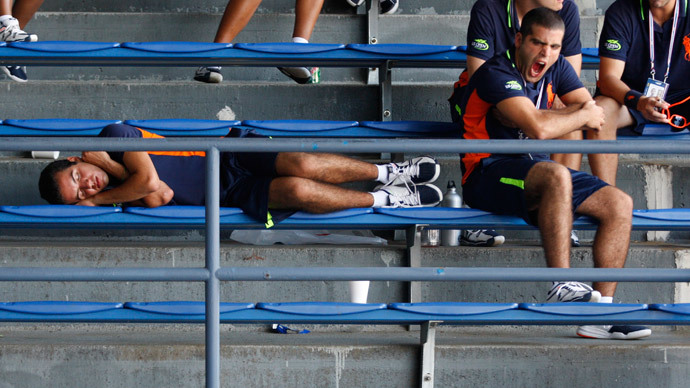Social media, internet stealing valuable sleep time from US teens

Large numbers of US teenagers are sleep-deprived, with girls, racial or ethnic minorities and students of lower socioeconomic status said to be particularly affected, according to the first major evaluation of sleep trends for American teens.
The study involved over 270,000 adolescents from the eighth, 10th and 12th grades asked in 1991-2012 surveys how often they got seven or more hours of sleep.
While nine hours is a standard recommended by the National Sleep
Foundation, many teens are less likely to regularly get even
seven or more hours of sleep nightly compared with their
non-Hispanic counterparts and students of higher socioeconomic
status. Inadequate sleep is meanwhile associated with a wide
range of health problems including mental health issues and
weight gain, to name a few.
The largest decrease in the percentage getting seven hours of
sleep nightly was for kids aged 15, with 72 percent reporting
regularly getting seven-plus hours of sleep per night back in
1991 versus 63 percent in 2012, a study by researchers at
Columbia University's Mailman School of Public Health has found.
The Great Sleep Recession: Changes in Sleep Duration Among US Teens, 1991–2012 http://t.co/BikX1BXcwz
— Psiquiatria Infantil (@PsiqInfantil) February 16, 2015
Racial and ethnic minorities and those whose parents had little
formal education responded that they were less likely to
regularly receive seven or more hours of sleep. However, they
were more likely to report getting adequate sleep, suggesting a
mismatch between actual sleep and illusions of adequate sleep.
"This finding implies that minority and low socioeconomic
status adolescents are less accurately judging the adequacy of
the sleep they are getting," assistant professor of
Epidemiology at the Mailman School of Public Health and lead
author, Katherine W. Keyes, explained.
READ MORE: Sleep therapy: Short daytime nap compensates for poor night’s rest, study says
While reasons for the decreases in hours of sleep are unknown,
factors that might have contributed include "increased
Internet and social media use and pressures due to the heightened
competitiveness of the college admissions process," Dr.
Keyes noted, adding that declines in self-reported adolescent
sleep across the last two decades are "concerning."
Among key factors to blame, according to Dr. Keyes, is increasing
use of social media, smartphones and other electronic devices
teens get hooked on. Other research has suggested that early
school start times also play a role with some pushing for later
times for teens.
The researchers say that improving teens' understanding of how
much sleep they really need, and the negative effects of not
getting enough, could help change things for the better.
Findings from "The Great Sleep Recession: Changes in Sleep
Duration Among US Adolescents, 1991-2012" are published online in
Pediatrics.












